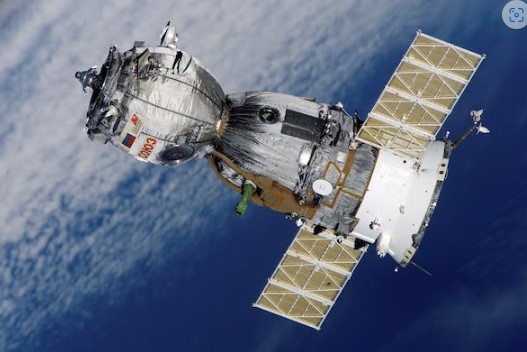The week of August 21st proved to be a memorable one.
I was privileged to board NNS Kano, a naval ship managed by the Nigerian Navy.
Onboard, I saw how reliable communication services were keeping the ship connected, ensuring coordination even far from the coast.
The mobile antenna installed on the ship was not just a tool of communication, but also a signal to what becomes possible when a nation invests in its own space and communication systems.
As I toured the vessel with the crew, the Captain explained with pride that theirs is one of the few ships with internet access wherever they sail, even up to 10-15 nautical miles off the coast of Nigeria as they perform their duties. In my excitement and pride at witnessing the moment, I hardly noticed I was climbing ladders in heels, forgetting that the occasion really called for more practical shoes. The moment, to me, was a clear reminder that space technology is not intangible and far away in the sky, but has a real value here on the ground, helping us protect our nation and build a stronger economy.
Why is my excitement at witnessing this moment? The story began a year ago when I visited the Naval dockyard on behalf of the Nigerian Communication Satellite (NigComSat) agency and discovered that the Nigerian Navy had built its own ship, being the only naval force in West Africa to achieve such a feat. We proposed using the NIGCOMSAT satellite to provide internet connectivity on the ship, as a way of bringing national assets together to strengthen sovereignty and security.
The responsibility to protect, manage, and guard the Nigerian coastal waters is no small feat, but reliable communication for safety and quick response makes all the difference. Today, the result speaks for itself. With zero piracy incidents in our waters, Nigeria has recently been removed from the global list of piracy-prone countries.
Satellite-enabled connectivity can also help in the navy’s fight against illegal oil bunkering, resulting in improved crude oil productio, and reduced revenue losses. With real-time communication on board, naval response times will improve, command and control can become more effective, and efficiency will improve. This is just one example of the complex use cases of satellite connectivity, which other access technologies cannot deliver.
If satellite connectivity can support and strengthen something as complex as naval operations, how much more can it do for Nigeria’s broader economy? The answer is a lot. The satellite technology is a multi-billion-dollar opportunity for economic growth in Nigeria and across Africa.
In Nigeria, the satellite communication market size is currently valued at $200.3 billion and is projected to reach $318.9 billion by 2029. Encompassed under the Information and Communications Technology (ICT) sector, the space economy has the ability to contribute to a growing portion of Nigeria’s GDP, reaching up to 19.78%.
The 2024 report by McKinsey further highlighted this potential, concluding that our large and fast-growing population and vast underserved regions could be transformed by expanded internet access through satellite infrastructure, which could potentially drive economic growth across the continent.
But what challenges stop us from maximizing this opportunity? The answer is a lack of infrastructure. I recently listened to a presentation by Afrinvest, which highlighted how infrastructure has continued to be one of the biggest challenges in Nigeria for the private sector. In Nigeria, the task of building the necessary infrastructure has been relegated primarily to one sector, and this limits the bulk of funding that is channelled towards infrastructural development.
In reality, relying on the private or even the public sector alone to build sufficient infrastructure required to attain the full potential of the space sector may not give us the momentum that we desire. Rather, all sectors, both private and public sectors, collaborating and working together, is far more likely to get us closer to success than one sector working independently of the other.
Adequate attention should be paid towards expanding investments and attracting public-private partnerships in the sector. And this can be achieved through value-based funding; when we are able to articulate the value, commercialization, and sustainability that such a project contributes to the economy, investors are more drawn to investing in value-driven projects.
On the flip side, investment without adequate management may prove very risky and counterproductive. Hence, there is a need to ensure the performance and efficient use of resources in the sector. In 2020, Nigeria invested over $50 million in this sector, ranking amongst the top 6 African countries investing in this sector. Yet, there is no clear return on the amount invested. This previous mismanagement only serves to highlight the need to ensure that a clear path for return on investments and value investing is followed through.
There is an Igbo adage that says, ‘Onye maara uzo ga-aga oso oso’, translating to ‘He who knows the road travels faster’. There is a need for a clear roadmap and space strategy detailing our strategy with clear KPIs and procurement rules for the next decade. Without a clear roadmap, investment risks being wasted effort, but with direction, it can become a force for real growth.
The future of Nigerian space technology cannot be achieved through wishful thinking. We cannot harness the potential of space technology without deliberate action, and we cannot continue to fall behind other nations when we have just as much capacity to achieve success as they do. It is time we began making strategic investments for the necessary infrastructure to reap the full benefits of space technology.
- Jane Nkechi Egerton-Idehen is the Managing Director/Chief Executive Officer of Nigerian Communications Satellite (NIGCOMSAT) Limited.























